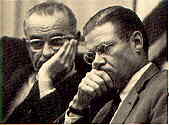IN RETROSPECT:
|
 |
IN RETROSPECT:
|
 |
This is the book I planned never to write.
Although pressed repeatedly for over a quarter of a century to add my views on Vietnam to the public record, I hesitated for fear that I might appear self-serving, defensive, or vindictive, which I wished to avoid at all costs. Perhaps I hesitated also because it is hard to face one's mistakes. But something changed my attitude and willingness to speak. I am responding not to a desire to get out my personal story but rather to a wish to put before the American people why their government and its leaders behaved as they did and what we may learn from that experience.
My associates in the Kennedy and Johnson administrations were an exceptional group: young, vigorous, intelligent, well-meaning, patriotic servants of the United States. How did this group--"the best and the brightest," as we eventually came to be know in an ironically pejorative phrase--get it wrong on Vietnam?
That story has not yet been told.
But why now? Why after all these years of silence am I convinced I should speak? There are many reasons; the main one is that I have grown sick at heart witnessing the cynicism and even contempt with which so many people view our political institutions and leaders.
Many factors helped lead to this: Vietnam, Watergate, scandals, corruption. But I do not believe, on balance, that America's political leaders have been incompetent or insensitive to their responsibilities and to the welfare of the people who elected them and to whom they are accountable. Nor do I believe they have been any worse than their foreign counterparts or their colleagues in the private sector. Certainly they have shown themselves to be far from perfect, but people are far from perfect. They have made mistakes, but mostly honest mistakes.
This underscores my own painful quandary about discussing Vietnam. I know that, to this day, many political leaders and scholars in the United States and abroad argue that the Vietnam War actually helped contain the spread of Communism in South and East Asia. Some argue that it hastened the end of the Cold War. But I also know that the war caused terrible damage to America. No doubt exists in my mind about that. None. I want to look at Vietnam in hindsight, not in any way to obscure my own and others' errors of judgment and their egregious costs but to show the full range of pressures and the lack of knowledge that existed at the time.
I want to put Vietnam in context.
We of the Kennedy and Johnson administration who participated in the decisions on Vietnam acted according to what we thought were the principles and traditions of this nation. We made our decisions in light of those values.
Yet we were wrong, terribly wrong. We owe it to future generations to explain why.
I truly believe that we made an error not of values and intentions but of judgment and capabilities. I say this warily, since I know that if my comments appear to justify or rationalize what I and others did, they will lack credibility and only increase people's cynicism. It is cynicism that makes Americans reluctant to support their leaders in the actions necessary to confront and solve our problems at home and abroad.
I want Americans to understand why we made the mistakes we did, and to learn from them. I hope to say, "Here is something we can take away from Vietnam that is constructive and applicable to the world of today and tomorrow." That is the only way our nation can ever hope to leave the past behind. The ancient Greek dramatist Aeschylus wrote, "The reward of suffering is experience." Let this be the lasting legacy of Vietnam.
I do so at the risk of oversimplification. One reason the Kennedy and Johnson administrations failed to take an orderly, rational approach to the basic questions underlying Vietnam was the staggering variety and complexity of other issues we faced. Simply put, we faced a blizzard of problems, there were only twenty-four hours in a day, and we often did not have time to think straight.
This predicament is not unique to the administrations in which I served or to the United States. It has existed at all times and in most countries. I have never seen a thoughtful examination of the problem. It existed then, it exists today, and it ought to be recognized and planned for when organizing a government.
Vietnam and my involvement in it deeply affected my family, but I will not dwell on its effect on them or me. I am not comfortable speaking in such terms; by nature, I am a private person. There are more constructive ways to address our nation's Vietnam experience than excessively to explore my own pride, accomplishments, frustrations, and failure.
In reflecting on Vietnam, I have often thought of words from a poem that Marg brought to my attention thirty years ago, in the exhilarating days when President Kennedy had just taken office. They are from T.S. Elliot's "Little Gidding":
| We shall not cease from exploration And the end of all our exploring Will be to arrive where we started And know the place for the first time. |
How did it happen? What lessons can be drawn from our experience?